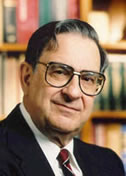Ernest Beutler, past president of ASH, died on October 5, 2008, at 80 years of age. Only a few months ago, Dr. Beutler's immense contributions to hematology were summarized in the May/June 2008 and January/February 2008 issues in The Hematologist in two articles: a brief biography and an acknowledgment of his receiving the Wallace H. Coulter Award for Lifetime Achievement in Hematology. (See links to these articles below.)
Dr. Beutler pursued his work with extraordinary intellectual power. Both the breadth of his research and the fluency of his writing were incomparable. He always pursued both basic and patient-centered research, finding inspiration in the clinical problems he witnessed firsthand. At times, however, his achievements seemed to materialize out of thin air.
Dr. Beutler's major scientific work began with the discovery that G6PD deficiency was responsible for hemolysis in primaquine-sensitive individuals. Aware that G6PD is encoded by an X-linked gene, he began to ponder the mechanism of dosage compensation in mammals, which in turn led him to deduce and prove the principle of random embryonic X-chromosome inactivation. With this, he identified the first example of stochastic epigenetic silencing in humans, and showed that human females are mosaics of X-chromosome activity. This, in turn, led to the strongest evidence that neoplastic diseases are, for the most part, clonal. Indeed, he foresaw the importance of epigenetics years before most of the scientific community fully understood it.
Over the years, Dr. Beutler made many other seminal contributions to science, and foremost to our understanding of red cell enzymopathies, Gaucher disease, Tay-Sachs disease, and disorders of iron metabolism. He also developed therapies for lymphoid malignancies (especially hairy cell leukemia), devised methods for blood preservation that remain in use today, was a pioneer in hematopoietic cell transplantation, and invented diagnostic tests for numerous genetic disorders.
He leaves behind those of us who benefited from his mentorship: countless scientific colleagues and collaborators, his four children whose accomplishments stand on their own merit, and his wife and special companion of 58 years, Bonnie. Bonnie's intellect, passion, and support were an invisible but sustaining factor in his accomplishments.
Dr. Beutler's many groundbreaking contributions have been, and will continue to be, appreciated by past, present, and future generations of scientists and physicians.

